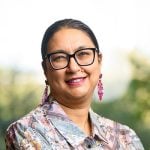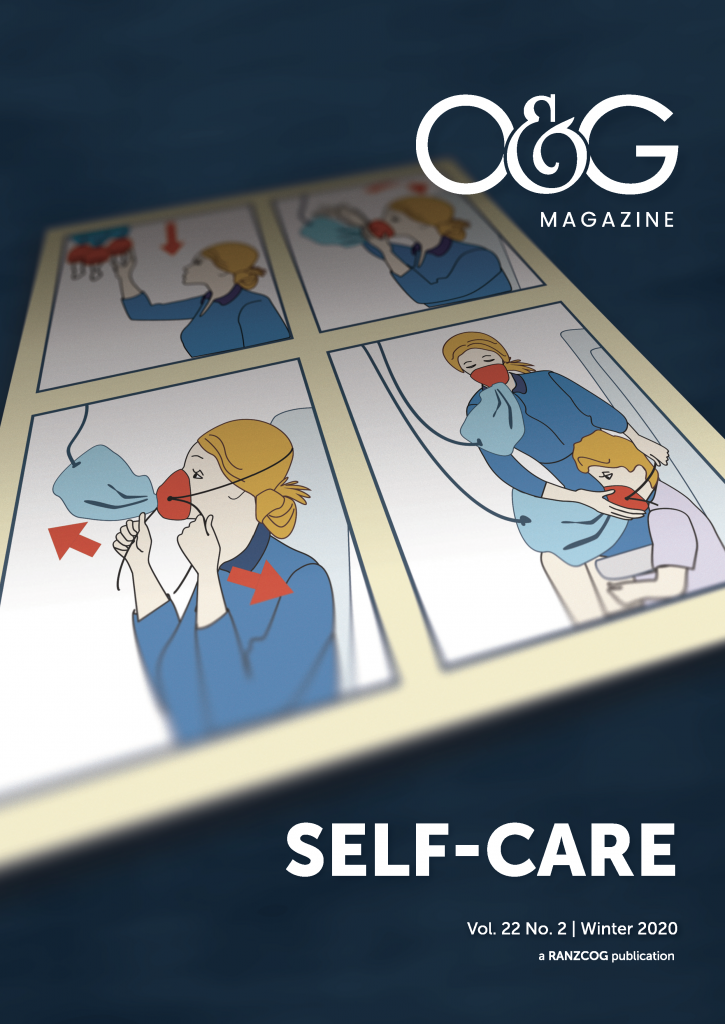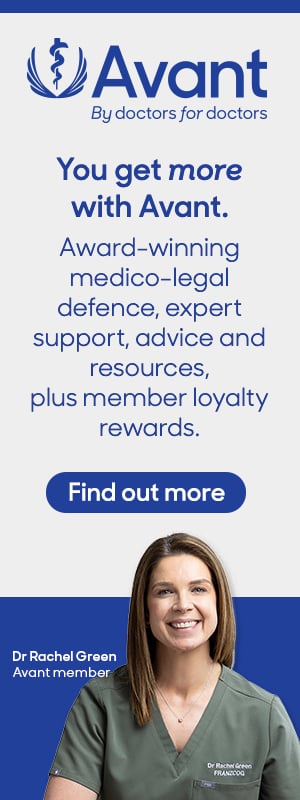This O&G Magazine feature sees Dr Nisha Khot in conversation with RANZCOG members in a broad range of leadership positions. We hope you find this an interesting and inspiring read. Join the conversation on Twitter #CelebratingLeadership @RANZCOG @Nishaobgyn
Dr Paul Howat
FRANZCOG
For those who don’t know Dr Paul Howat, this interview will hopefully be the perfect introduction to the Chair of the newly formed Wellbeing Committee at RANZCOG. It seems only appropriate, given the theme for this issue is Self-care. This Committee will aim to address the issues that have a huge impact on all of us at different stages in our career.
What does a typical day look like for you?
My typical day has changed quite a bit since the pandemic. These days it often starts off as ‘work from home’ checking emails and dominated by all things COVID-related. The positive side to this is that I have rapidly upskilled in the use of technology and learnt new skills. We had our first Mortality and Morbidity meeting via Zoom last month. I was pleasantly surprised that the attendance was better than when we had the meetings in person.
One thing that hasn’t changed despite this new way of life is my evening walk with Sibyl, our Soft-coated Wheaten Terrier.
What prompted you to choose O&G?
I really enjoyed O&G as a medical student. I will give credit for this to my exceptional teachers at Melbourne University who not only taught the subject well but also took a keen interest in their students. My love for O&G only grew once I started my training at Mercy Hospital. I liked the combination of medicine and surgery. I was always made to feel welcome in the specialty as a student. Our current students rank O&G as their best taught and most enjoyable subject at my university. This reflects the same passion I experienced all those years ago.
What advice would you give specifically to male medical students and interns wanting to pursue a career in O&G?
My advice would be the same regardless of gender. If you are interested in O&G and you care about women’s health, don’t let your gender be a barrier to choosing a career in O&G. You will not be made to feel unwelcome and your seniors will by and large support you. I acknowledge that every male doctor will encounter some patients who will not want to be cared for by them. Respect the decision that these women make and remember that there are always solutions.
I encourage medical students and interns to get involved in advocacy in the simplest ways possible. Teaching boys and young men how to interact respectfully with women is something that can have a huge impact on women’s health and wellbeing. Ultimately, this belief in equity for all should underpin any career decision and especially one in women’s health.
What roles have you had within RANZCOG? What did you achieve and what did you learn?
I was on the RANZCOG State Committee for Queensland when I worked in Cairns. I was a member of the Queensland State Committee for eight years and Chair for four. I was encouraged by my senior colleagues to take on this role and I benefited from the experience of regularly interacting with the College, the Department of Health and the relevant ministers at the time. I was able to highlight indigenous health issues within the state as well as be a voice outside the state capital.
My proudest achievement was the setting up of an exam preparation course in Queensland where none had existed before. This was especially valuable for local trainees who prior to this would travel to Sydney or Melbourne to attend a course. I ran the course myself for three years before handing over the reins. I am happy that it is still going strong with good attendance numbers.
What leadership roles have you held and what advice would you give to aspiring leaders?
I was the Director of Women’s Health Services in Cairns for many years. I am currently the Divisional Director of Women’s and Children’s Health Service at Northern Hospital in Victoria.
I believe that, as doctors, we are all leaders. At the most basic level, a doctor is the leader of their team. This may be a team in theatre performing surgery or a team looking after women in labour. The ability to communicate clearly and succinctly is crucial to effective leadership. Always put your patient first when making any decision. Accept feedback from every team member because this will help you hone your leadership style. As you gain experience, put yourself forward for positions that bring more responsibilities. And remember to nurture leadership in those around you. One of the most important roles of a leader is to have a succession plan in place. My own experience of encouraging my trainees in Cairns to take on further responsibilities meant that when I left, I handed the running of the department to very capable colleagues – a fine team of committed and remarkable women.
What are your future plans?
As I get closer to retirement, I am rethinking my priorities. I started a Masters of Surgical Education through RACS and am planning a sabbatical to further my knowledge and experience in education. I want to design a low-cost, realistic simulation-based model to teach vaginal surgery including vaginal hysterectomy. I am also interested in exploring the effects of surgical error on the surgeon, their wellbeing and their career. After I turn 60, I really only see myself working one to two days a week in areas I find stimulating and challenging.
In addition, I want to explore the non-medical world. A career in medicine can mean our younger, early interests fall away due to the narrow focus of our careers. A busy clinical life leaves very little time and opportunity for other pastimes. I have many happy memories of childhood camping trips. Travel may look very different in the future. I loved camping away for weeks on end as a child and I’d love to do that again and explore our wonderful country with Mark and Sibyl, and go to places we’ve never been. It will also be a good way to catch up with friends across Australia. I enjoy cooking and am starting to grow my own food too. I am looking forward to a simpler life.
How do you look after yourself as well as your trainees and colleagues?
I got a bit of a wake-up call recently and this has prompted me to take my own health seriously. I enjoy walking and last year, Mark and I walked 320km across the UK from one coast to the other. We knew it would be tough and we trained for it by going on long walks locally. The sense of achievement at the end of the walk was so special that we vowed to do many more walks.
Trainee wellbeing and the wellbeing of Fellows and Diplomates is something I have always been passionate about. I am very happy to see that this is something the College is addressing proactively. I hope the Wellbeing Committee that has been set up will tackle bad behaviour and bullying at all levels. ‘Operate with Respect’ should be the basis for all professional interactions, whether they be between peers or with trainees.
What message do you have for your younger self?
Be kind to yourself. You have no reason to be ashamed of who you are.
Be forgiving of others. You don’t know what they are dealing with in their life.
Above all, make time for yourself, for the things you love and for the people you love.
Author’s note
If you have not yet read it, I recommend you read Paul’s Letter to get to know more about his life and career.
Those who know Paul will also be familiar with his cooking skills. Since many of us are honing our cooking and baking skills while in COVID-19 restrictions, Paul has very kindly shared his recipe for pumpkin scones.
Pumpkin scones
My grandmother taught me to make scones. The key is to have the lightest touch to bring all the ingredients together, and don’t overwork the dough. Pumpkin scones are associated with Queensland and are sometimes mocked, but they look and taste great, are an excellent way of using up pumpkins and they celebrate the 20 years I spent in that great state.
Ingredients
250g pumpkin
300g self-raising flour
Pinch of salt
20g butter
1 egg
Method
The pumpkin needs to be cooked – if you steam it or boil it, it becomes very wet. Steaming is probably better, or you could bake it in the oven – even better.
Puree the pumpkin – I like to push it through a strainer to remove any fibrous bits.
Sift the flour and salt and rub in the butter and pumpkin puree with your fingers.
Add the beaten egg to make a soft dough – don’t overmix it.
Add a little bit of milk if it is too stiff.
Put it on a floured surface and gently pat down to about 3cm thickness.
Cut into wedges with a floured knife – sharp downward push.
Brush with milk and bake for 15–20 minutes at 200°C.
These scones cry out for butter. They don’t taste right with other spreads, so if you don’t eat butter I’d suggest just enjoying them on their own.
If you would like to nominate someone to be featured in Leaders in Focus – someone who has been a mentor to you and would be of interest to the wider O&G community – please let me know.
You can send your nomination to Sarah Ortenzio, O&G Magazine Editor: [email protected].
– Dr Nisha Khot






Leave a Reply